AI Breast Cancer Screening technology, developed by Chinese researchers, is setting a new standard in early detection by making advanced screening accessible through smartphones. By combining artificial intelligence (AI) and infrared thermography (IRT), this technology empowers individuals with a non-invasive, affordable method to assess breast cancer risk. Now, users can utilize AI-driven tools to capture and analyze thermal images using a smartphone-compatible infrared camera, bringing a viable screening solution to millions.
AI Breast Cancer Screening: A New Era in Healthcare
Breast cancer detection has long been a global health priority, as early detection is critical to effective treatment and improved survival rates. However, conventional screenings like mammograms, MRIs, or ultrasounds often require costly equipment and clinic visits, limiting their accessibility. AI Breast Cancer Screening on smartphones addresses these barriers with a practical, low-cost, and portable option.
How AI Breast Cancer Screening Works
The AI-IRT system utilizes a smartphone-attached infrared camera, an app, and a backend AI platform that processes the captured thermal images. Users simply take an image, and the AI analyzes thermal variations that may indicate breast cancer risk. This non-invasive method is designed to provide users with instant feedback, offering a preliminary screening that can help prompt medical consultation if necessary.
Key Benefits of Smartphone-Based AI Breast Cancer Screening
1. Non-Invasive and Radiation-Free: Unlike mammography, which uses low-dose X-rays, this IRT-based method eliminates radiation exposure, allowing users to screen regularly without added health risks.
2. Convenient and Rapid: With a smartphone, individuals can screen from home or anywhere, without the need for specialized equipment or clinical appointments.
3. Accessible and Affordable: As it doesn’t rely on large-scale medical devices, this AI technology has the potential to reach underserved communities worldwide, making breast cancer screening accessible to those who need it most.
The Role of Artificial Intelligence in Breast Cancer Detection
The integration of AI in breast cancer detection represents a transformative step forward. AI’s ability to analyze data rapidly with high precision means that each scan receives real-time assessment, identifying even subtle patterns that might signal potential risks. This democratizes access to preventive care by empowering people with an easy-to-use, reliable tool.
The adoption of AI Breast Cancer Screening could have a significant impact on global health, particularly in regions with limited healthcare resources. By eliminating the need for large, costly diagnostic equipment, this technology democratizes healthcare access, allowing individuals in low-resource settings to benefit from modern detection techniques. The widespread application of this technology could improve survival rates by encouraging early detection and timely treatment.
Future Prospects for AI Breast Cancer Screening
AI-driven smartphone screening is still evolving, with researchers focused on refining the accuracy and usability of these tools. As technology progresses, AI Breast Cancer Screening could incorporate more sophisticated algorithms and expanded functionalities, ensuring even greater accuracy and ease of use. The broader adoption of this technology could redefine how individuals approach preventive health, placing life-saving screening tools directly into their hands.
The AI Breast Cancer Screening on smartphones represents a significant shift in medical technology and public health. By making reliable, non-invasive screening accessible, this innovation holds the potential to reduce breast cancer mortality rates by supporting early intervention. As more people gain access to this technology, the fight against breast cancer becomes increasingly global, inclusive, and proactive.
Vaccine Found to Prevent Ovarian Cancer
University of Oxford researchers have developed OvarianVax, a vaccine found to prevent ovarian cancer by training the immune system to target early-stage cancer cells. Led by Professor Ahmed Ahmed, the team is focusing on specific proteins linked to ovarian cancer. Funded by Cancer Research UK, the vaccine could offer a preventive option, particularly benefiting women with BRCA mutations.


